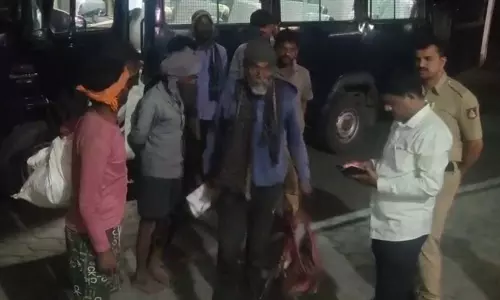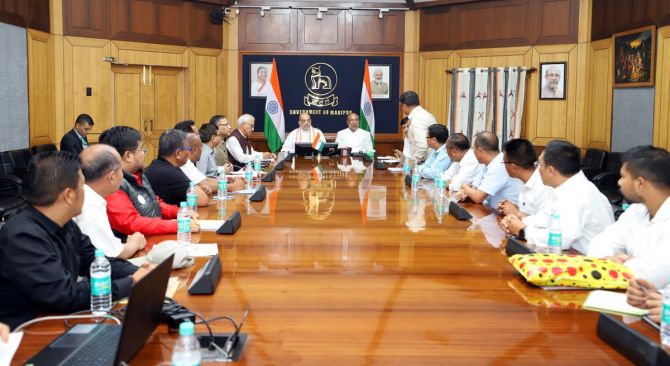
The 'double engine' model of Manipur
text_fieldsUnion Home Minister at the all-party meeting in Manipur
It is a welcome development that the Union government came forward to call an all-party meeting on the Manipur issue, albeit after more than 100 people were killed and more than 60,000 displaced. A long-term solution to any conflict first needs normalization. Peace efforts cannot even begin before violence and anarchy die down. Consultations with representatives of all sections are imperative to restore normalcy. A peace committee was formed by the Union government, but it did not bear fruit. Many who were nominated to the committee refused to join it. While some complained that they were not informed in advance, some others were adamant that they would not sit in a committee that included chief minister Biren Singh. It was then that a demand was raised that the Prime Minister himself should convene an all-party meeting. Negotiations involving the representatives from all political parties and influential leaders of the society, and overcoming the shortcomings of the peace committee, could have been the first step to de-escalate the crisis. Unfortunately, the negotiations were not organized in such a way that the mutual trust that was lost could be restored. The meeting was called by the Home Minister, not the Prime Minister. It happened in New Delhi and not in the state. CPI's Rajya Sabha member Santosh Kumar, who had come to attend the meeting, was denied entry as he was not invited. Various parties complained that the Home Minister was more interested in explaining the steps taken to quell the riots than listening seriously to what the participants had to say. Party leaders were given less time.
Even after two months of the riots, the Prime Minister has not visited Manipur or said anything about the riots. The government did not give any clarification in this regard at the all-party meeting. Reports say that there was no indication whether the government has any action plan to restore peace, and if so, what they were. Questions such as whether an all-party team will be sent to the state and whether the Chief Minister, who had proven his inefficiency, would be replaced, were not answered. Rather than the proceedings of a meeting, what rendered the All-Party Meeting useless was another demonstration of the dangerous one-sided approach that has plagued all Union government policies. The essence of this approach is an unwillingness to listen to others and to evaluate them impartially. The ability to listen and absorb criticism is key to problem solving. Errors are corrected only when they are acknowledged as errors. The problem in Manipur is complex. It is clear that a military solution is not possible. Nowhere has force, unilateralism or military force solved any problem any where not merely in Manipur. . Listening to opponents and critics is the first step to a democratic and lasting solution. The all-party meeting provided an opportunity for that. Although it had shortcoming, that was a good start, provided it is followed up with necessary corrections.
Leadership vacuum has stood in the way of a solution to the Manipur problem since the beginning. The 'double engine' that the BJP leadership is so proud of has not been enough to fill this void. Biren Singh's government, which came to power after winning the elections announcing that it would make Manipur a developed state in 25 years, lost the trust of the locals including his own party members within the span of a year. Biren Singh was seen by all as a failure as the state was plunged into a serious ethnic quagmire. The Prime Minister has the responsibility to prove his leadership by coming with relief and solution efforts. But he did not make a single statement, let alone visiting the troubled area. Given to tweeting even on trivial matters, he however remained silent on the Manipur issue. In his 'Mann ki baat' talk, Modi recalled the difficult times of the Emergency, but nothing was mentioned about the sufferings of the people of Manipur today. This inaction compounds Manipur's lack of leadership. Not only the rivalry between the Kukis and Meiteis but also the loss of trust in the state is the cause of the state's crisis. Home Minister Amit Shah says Modi's failure to respond publicly does not mean he is not involved in the issue. But the people had wished for words of consolation and a call for peace from the Prime Minister in public. People's trust can be maintained only when they are able to communicate properly with the minds of the people and listen to what they have to say. After all, people too have their 'mann ki baat'.


























